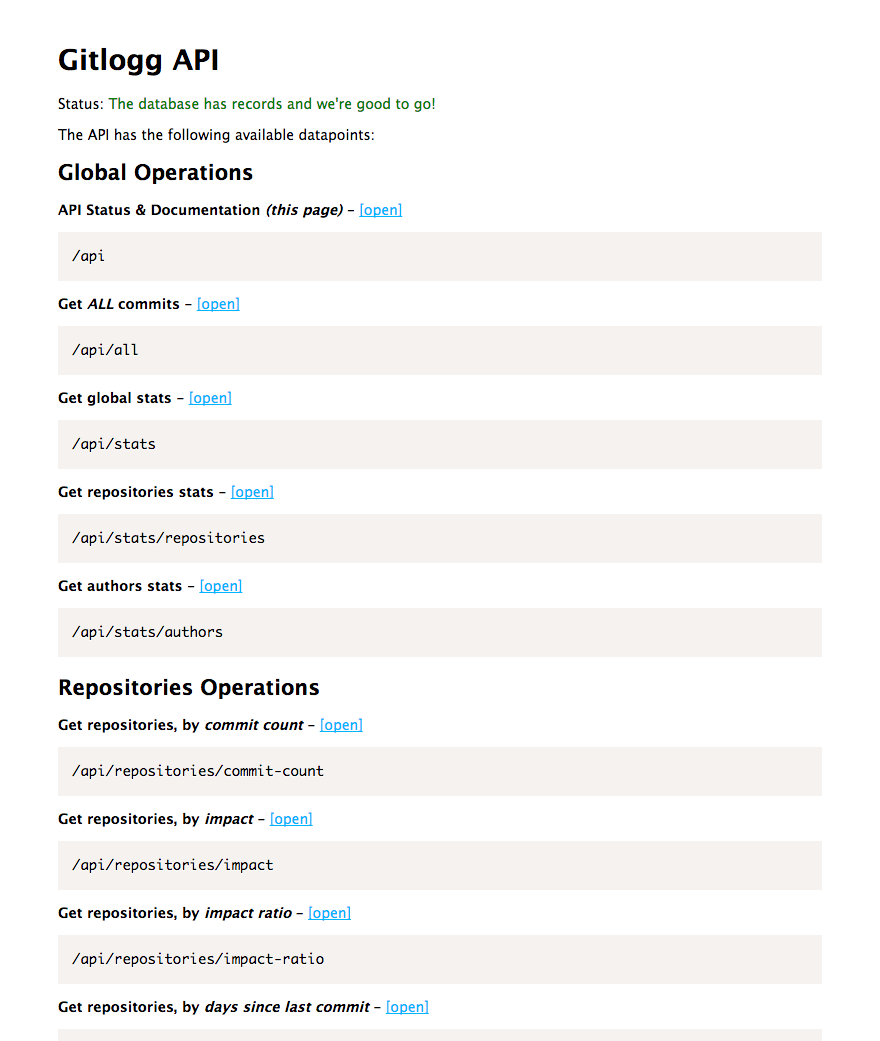API for the data provided by Gitlogg, so that one can retrieve
git logdata from one or more repositories in relevant chunks.
Gitlogg sanitises the git log and outputs it to JSON, a format that can easily be consumed by other applications. As long as the repositories being scanned are kept up to date, Gitlogg will return fresh data every time it runs.
Gitlogg API was designed solely to distribute the git log data already parsed by Gitlogg. Therefore it only makes sense to use it if you've already got the data parsed to JSON but need a middleware to crunch the data into smaller, meaningful chunks also in JSON format. From there one can build more complex applications to visualise the data.
Gitlogg API consists not only of a server and a database with data endpoints, but also features some views that will give you a very basic glance over the data.
Gitlogg API requires NodeJS and MongoDB.
To get started, follow these steps, in this order:
- Place the parsed
gitlogg.jsonfile, which is the output of Gitlogg, at the root of the project. This is the 1st step because Without it, there's no point initialising the API. - Install
NodeJS(visit their page to find the right install for your system). - Install
MongoDB(visit their page to find the right install for your system). - On the 1st terminal window, run
mongod. That will initialise MongoDB. More details on MongoDB processes here. - On the 2nd terminal window, navigate to where you've cloned this project and run
npm install. That will install all dependencies. - On the same window, run
npm run import. That will create a new collection on themongodatabase and import the data withingitlogg.jsoninto it. - On the same window, run
gulp. That will compile static files and initialise the server with live-reload.
Optional: On a new terminal window, run mongo. That will open you a shell from which you can query and update data as well as perform administrate operations. This step is not necessary but the shell can help you debug problems with the database.
The API interface is fully dynamic and based on currently available datapoints. It currently looks like this:
Please DO NOTE that since this API is based on the data outputted by Gitlogg, the datapoints are intrinsically connected to the structure and the naming convention of that data!
I'll refrain from posting all the datapoints in this README file, but some examples are in order. For a full overview, initialise the API and visit http://localhost:7000/api.
Get ALL commits
/api/all
Get global stats
/api/stats
Get repositories stats
/api/stats/repositories
Get authors stats
/api/stats/authors
Get repositories, by commit count
/api/repositories/commit-count
Get repositories, by impact
/api/repositories/impact
Get repositories, by impact ratio
/api/repositories/impact-ratio
Get repositories, by days since last commit
/api/repositories/days-since-last-commit
Get repositories, by staleness
/api/repositories/staleness
Get repositories, by days active
/api/repositories/days-active
Get repositories, by number of contributors
/api/repositories/contributors-nr
Get all commits with same repository
/api/repository/:repository
Get all commits with same commit_nr
/api/commit_nr/:commit_nr
Get all commits with same commit_hash
/api/commit_hash/:commit_hash
Get all commits with same author_name
/api/author_name/:author_name
Get all commits with same author_email
/api/author_email/:author_email
...and some others.
Gitlogg API can also be used in conjunction with Gitinsight, that will render the data provided by the API.
Since Gitlogg API relies on Gitlogg to generate the data in JSON format, which is in turn imported into the database, massaged by the API and served to Gitinsight that renders the data through meaningful React components, these projects are all interconnected. 💞
Post an issue with a link to a gist containing your error and I will try to reproduce it.
The heart of the API's documentation will always be at the /api URL. There one will find all the available data endpoints and or a guide on how to use it dynamically.
Further "development" documentation is otherwise provided through:
- Commit messages,
- Commit comments,
- Code comments,
README.mdfiles, like this one.
Some of the initial commits were done deliberately to show what it took to put this application together. From that point on commits keep on introducing simplicity or complexity to the code, depending on the work flow. That in itself is a form of documentation. In other words, if you're really that interested in details, there are plenty to be had in the code itself and in its own progressive enhancement.
This project is by no means the smartest way to build an API, nor does it aim at becoming so. It is simply a learn-by-doing project in which I experiment with whatever I find along the way.
Both Gitlogg and Gitlogg API were built and tested on OSX/macOS. Though an effort has been done to make it cross-platform, there could be errors on other systems.
Gitlogg is certainly not harmful to your repositories and it won't change any data in it. Gitlogg API is self-contained and is not supposed to affect any other application or process in your machine.
Having said that, they're served raw and 'as is'. You may get support, but don't expect it nor take it for granted.
- No caching, yet. Depending of the size of your data, the API will load, but with a lot of lag.
- There are no tests at the moment, so some of the helper functions may not fully work as they are expected to.
None of these issues are detrimental to the functionality of the current API at the time of this writing, AFAIK.
- 2018-04-08 v0.1.2 - View Changes
- Update README so that Gitlogg API's relationship to Gitlogg and Gitinsight is more obvious
- 2017-03-05 v0.1.1 - View Changes
- Correct 'module.exports' on helpers so that their functions are correctly referred to.
- 2017-03-05 v0.1.0
- First release. Basic API is up and running with various data endpoints.
Brought to you by Wallace Sidhrée.



